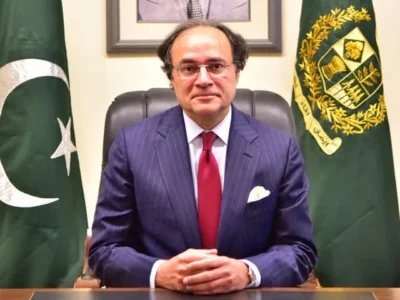Washington: Pakistani Finance Minister Muhammad Aurangzeb disclosed on Saturday that an International Monetary Fund (IMF) team is anticipated to visit Pakistan by mid-May to negotiate a new long-term process, with the aim of securing a staff-level agreement by mid-July.
During a briefing with US-Pakistani media at the conclusion of his week-long visit, the minister emphasized the Fund’s intention to expedite the process. “The contours of the new program will shape up later. We will start getting into granularity of the program by mid-May,” he added.
Addressing journalists at the Pakistan Embassy, Mr Aurangzeb expressed hope that the IMF’s board of governors would convene to consider the last tranche of the current program by the end of this month, with the final installment released shortly thereafter.
Pakistan is seeking a $6-8 billion new loan package from the IMF. Earlier statements from the minister indicated a preference for a long-term, preferably a three-year program. However, when questioned at Saturday’s briefing, Mr Aurangzeb refrained from speculating on the size or duration of the program.
Mr Aurangzeb’s remarks came after discussions with key financial institutions like the IMF and World Bank, alongside senior US officials in Washington this week.
Explaining his stance on the sensitive issue of debt repayment to China, Mr Aurangzeb underscored the importance of completing the second phase of the China-Pakistan Economic Corridor (CPEC) before repaying debt. He emphasized the significance of CPEC Phase 2, particularly in monetizing existing infrastructure through special economic zones.
During his visit to Washington, Mr Aurangzeb commended China’s invaluable contribution to Pakistan’s development through initiatives like CPEC in a meeting with Chinese Finance Minister Lan Fo’an.
The finance minister also met representatives from S&P Global and Fitch Ratings on Saturday, highlighting Pakistan’s positive indicators under the IMF’s Stand-By Arrangement (SBA). He discussed ongoing reforms in taxation, energy, and privatization, as well as the alignment of the World Bank’s agenda with government priorities. Additionally, potential Saudi investments and concerns from rating agencies regarding the external side, inflation, primary balance, and interest rates were addressed.
